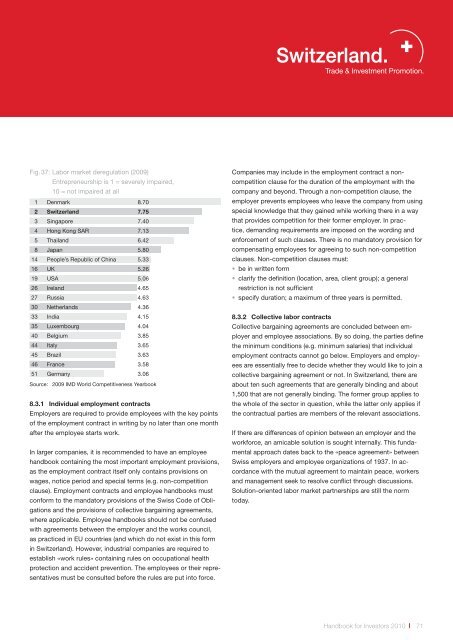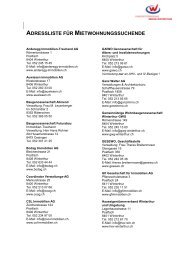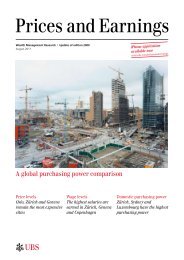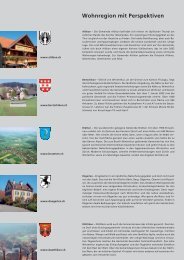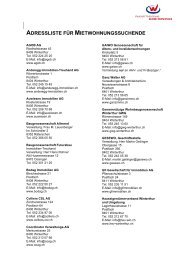Handbook for Investors. Business location in Switzerland.
Handbook for Investors. Business location in Switzerland.
Handbook for Investors. Business location in Switzerland.
Create successful ePaper yourself
Turn your PDF publications into a flip-book with our unique Google optimized e-Paper software.
Fig. 37: Labor market deregulation (2009)<br />
Entrepreneurship is 1 = severely impaired,<br />
10 = not impaired at all<br />
1 Denmark 8.70<br />
2 <strong>Switzerland</strong> 7.75<br />
3 S<strong>in</strong>gapore 7.40<br />
4 Hong Kong SAR 7.13<br />
5 Thailand 6.42<br />
8 Japan 5.80<br />
14 People’s Republic of Ch<strong>in</strong>a 5.33<br />
16 UK 5.26<br />
19 USA 5.06<br />
26 Ireland 4.65<br />
27 Russia 4.63<br />
30 Netherlands 4.36<br />
33 India 4.15<br />
35 Luxembourg 4.04<br />
40 Belgium 3.85<br />
44 Italy 3.65<br />
45 Brazil 3.63<br />
46 France 3.58<br />
51 Germany 3.06<br />
Source: 2009 IMD World Competitiveness Yearbook<br />
8.3.1 Individual employment contracts<br />
Employers are required to provide employees with the key po<strong>in</strong>ts<br />
of the employment contract <strong>in</strong> writ<strong>in</strong>g by no later than one month<br />
after the employee starts work.<br />
In larger companies, it is recommended to have an employee<br />
handbook conta<strong>in</strong><strong>in</strong>g the most important employment provisions,<br />
as the employment contract itself only conta<strong>in</strong>s provisions on<br />
wages, notice period and special terms (e.g. non-competition<br />
clause). Employment contracts and employee handbooks must<br />
con<strong>for</strong>m to the mandatory provisions of the Swiss Code of Obligations<br />
and the provisions of collective barga<strong>in</strong><strong>in</strong>g agreements,<br />
where applicable. Employee handbooks should not be confused<br />
with agreements between the employer and the works council,<br />
as practiced <strong>in</strong> EU countries (and which do not exist <strong>in</strong> this <strong>for</strong>m<br />
<strong>in</strong> <strong>Switzerland</strong>). However, <strong>in</strong>dustrial companies are required to<br />
establish «work rules» conta<strong>in</strong><strong>in</strong>g rules on occupational health<br />
protection and accident prevention. The employees or their representatives<br />
must be consulted be<strong>for</strong>e the rules are put <strong>in</strong>to <strong>for</strong>ce.<br />
Companies may <strong>in</strong>clude <strong>in</strong> the employment contract a noncompetition<br />
clause <strong>for</strong> the duration of the employment with the<br />
company and beyond. Through a non-competition clause, the<br />
employer prevents employees who leave the company from us<strong>in</strong>g<br />
special knowledge that they ga<strong>in</strong>ed while work<strong>in</strong>g there <strong>in</strong> a way<br />
that provides competition <strong>for</strong> their <strong>for</strong>mer employer. In practice,<br />
demand<strong>in</strong>g requirements are imposed on the word<strong>in</strong>g and<br />
en<strong>for</strong>cement of such clauses. There is no mandatory provision <strong>for</strong><br />
compensat<strong>in</strong>g employees <strong>for</strong> agree<strong>in</strong>g to such non-competition<br />
clauses. Non-competition clauses must:<br />
• be <strong>in</strong> written <strong>for</strong>m<br />
• clarify the def<strong>in</strong>ition (<strong>location</strong>, area, client group); a general<br />
restriction is not sufficient<br />
• specify duration; a maximum of three years is permitted.<br />
8.3.2 Collective labor contracts<br />
Collective barga<strong>in</strong><strong>in</strong>g agreements are concluded between employer<br />
and employee associations. By so do<strong>in</strong>g, the parties def<strong>in</strong>e<br />
the m<strong>in</strong>imum conditions (e.g. m<strong>in</strong>imum salaries) that <strong>in</strong>dividual<br />
employment contracts cannot go below. Employers and employees<br />
are essentially free to decide whether they would like to jo<strong>in</strong> a<br />
collective barga<strong>in</strong><strong>in</strong>g agreement or not. In <strong>Switzerland</strong>, there are<br />
about ten such agreements that are generally b<strong>in</strong>d<strong>in</strong>g and about<br />
1,500 that are not generally b<strong>in</strong>d<strong>in</strong>g. The <strong>for</strong>mer group applies to<br />
the whole of the sector <strong>in</strong> question, while the latter only applies if<br />
the contractual parties are members of the relevant associations.<br />
If there are differences of op<strong>in</strong>ion between an employer and the<br />
work<strong>for</strong>ce, an amicable solution is sought <strong>in</strong>ternally. This fundamental<br />
approach dates back to the «peace agreement» between<br />
Swiss employers and employee organizations of 1937. In accordance<br />
with the mutual agreement to ma<strong>in</strong>ta<strong>in</strong> peace, workers<br />
and management seek to resolve conflict through discussions.<br />
Solution-oriented labor market partnerships are still the norm<br />
today.<br />
<strong>Handbook</strong> <strong>for</strong> <strong>Investors</strong> 2010<br />
71


